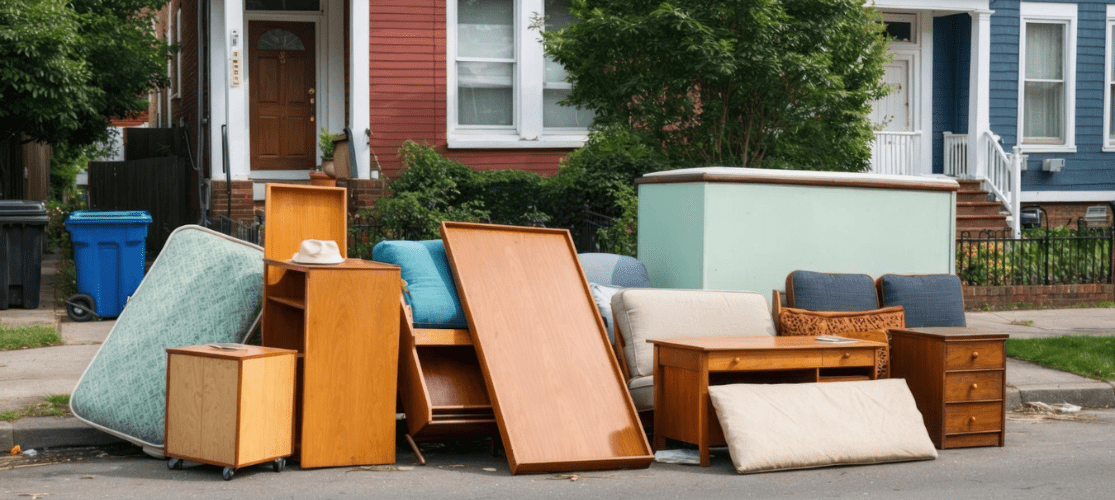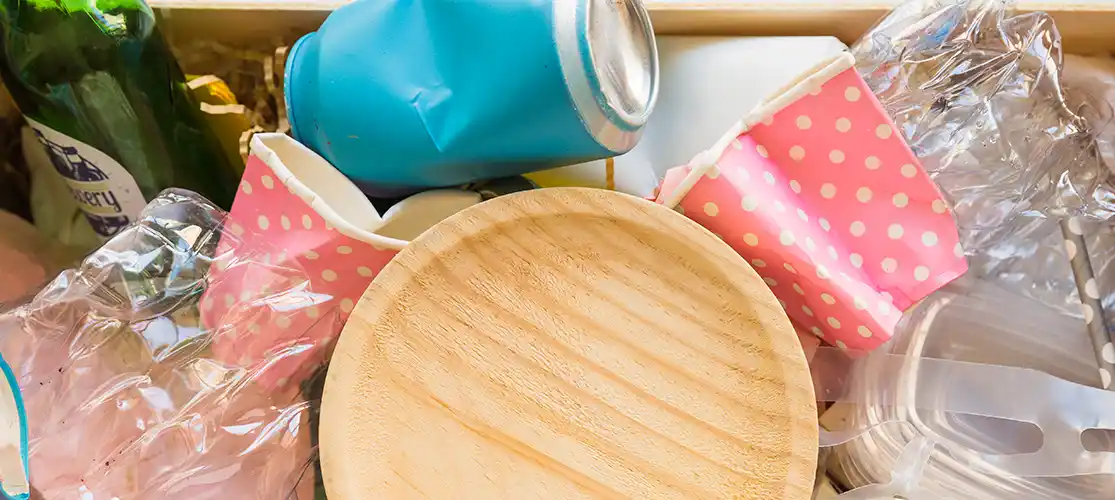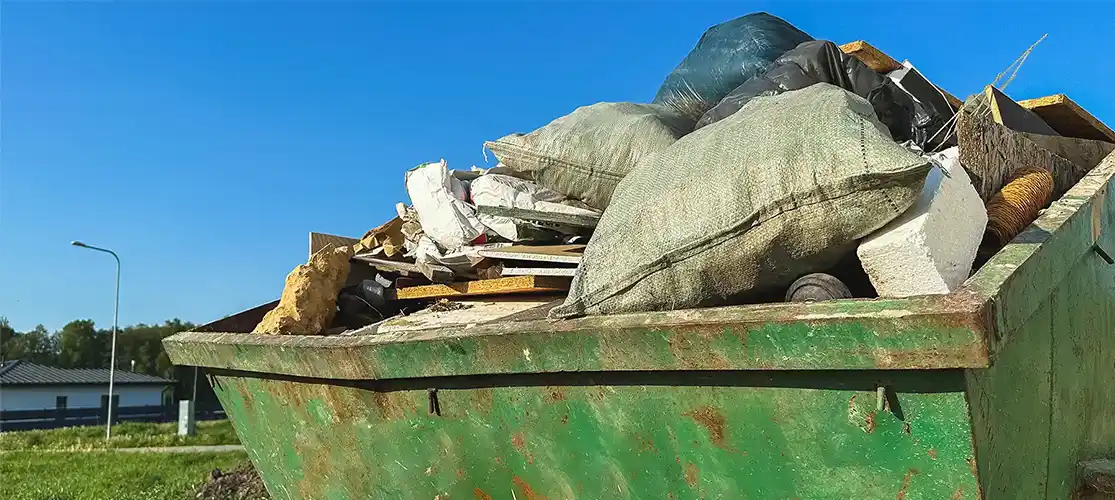DIY projects can be exciting, but also stressful – especially if your renovation space is full of rubbish and waste that needs to be thrown away. In this article, we are going to explore the typical waste generated in home renovation projects, discuss the different waste disposal options you can choose for said waste, and run through how to plan for waste management in renovations.
What waste is generated in a renovation?
Renovation projects are messy. There’s old materials, packaging from new materials, broken tools – all sorts! The waste generated in your home renovation project can vary, depending on the type of property and the nature of the project, but common waste materials include:
- Construction timber such as plywood, boards and pallets.
- Waste timber from stripped floorboards, doors, furniture, skirting boards, sheds and fences.
- Ceramics, including roofing tiles, floor tiles, sinks, toilets, and baths.
- Glass from windows, mirrors and shower screens.
- Carpets
- Rubble, including concrete, plasterboard, bricks, drywall, asphalt, and roof shingles.
- Excavated soil
- Plumbing fixtures, like pipes and faucets.
- Electrical wiring
- Finishing products such as paint cans.
- Household appliances
As well as all of this, renovation waste may also include hazardous materials such as asbestos, lead-based paints, and chemicals from cleaning products. Proper disposal of these materials are crucial, not just to keep the place tidy, but also for environmental protection and compliance with local regulations.
Waste disposal options in renovations
Depending on the scope of work,the type and the amount of waste generated, there are a few different options for waste management in renovations. We’re going to run through a few of the most popular options.
Man with a Van
A Man with a Van service is the perfect option for smaller projects, such as kitchen refits or furniture disposal. It’s a convenient solution to waste management in renovations, and is ideal if you don’t have the space to leave a skip, or if you only have a small amount of waste. When you choose our Man with a Van service, our driver does all the lifting and loading, and we can often offer same day collection if required!
However, a Man with a Van might not be for you if you have large volumes of waste, or if the waste includes any of the following materials:
- Hazardous or clinical waste
- Sharp materials, including knives and needles
- Paint tins
- Pressurised containers
- Weapons or explosives
- Lithium ion batteries
- Loose rubble
- Plasterboard
Grab lorry
A grab lorry is a fantastic alternative if you have a lot of waste that needs removing and limited space for a skip. Grab lorries use a hydraulic grab arm and bucket to collect large quantities of waste. Waste is piled up on a driveway or other outdoor area, and grab lorries can collect and dispose of it for you, without the need for manual labour. Unlike a Man with a Van, grab lorries are able to collect loose rubble such as soil, bricks, concrete and general building rubbish.
Although grab lorries can efficiently manage a wide range of different waste products, it’s important to remember the items they aren’t able to accept, such as hazardous materials, batteries, gas bottles, paints, oils, and asbestos.
Skip
Hiring a skip is probably the most popular method of waste disposal for renovations in the UK, as customers are able to hire the skip for an extended period of time and have it collected when the skip is full.
There are a number of different sizes of skip available for hire in the UK, including 4 yard, 6 yard, 8 yard, 10 yard, 20 yard RoRo, 25 yard RoRo, 40 yard RoRo and 50 yard RoRo, depending on how much waste you are expecting to generate. It’s best to discuss your project with the skip company if you’re not sure what size skip you will need, as often skips cannot be collected if they’re overfilled.
As with other forms of waste disposal, there are certain things that cannot be thrown away in a skip, including:
- Asbestos
- Lithium batteries
- Clinical or medical waste, including syringes
- Fluorescent tubes
- Gas canisters and gas bottles
- Hazardous and toxic materials
- Liquids
- Oil, petrol, diesel
- Paint, including cans of liquid paint
- Tyres
- TVs and computer screens
Another thing you need to be aware of if you decide to dispose of your renovation waste in a skip is the possible need for a skip licence. It is required if you need to locate a skip on a road or other public right of way.
How to plan your waste management
Now that you know your options, you need to develop a strategy for your renovation waste. There are four main things you need to plan:
- Estimate the amount of waste that will be generated: Without an idea of how much waste you think will be generated, it’s impossible to choose which waste disposal system to use, or which size skip if you choose that route. Think about the size of your renovation – is it one room, or a whole house? Talk to your contractor about what types of waste you’re expecting to have and how much there will be.
- Plan how to sort and separate waste if necessary: Depending on the system you choose, you may need to sort and separate your waste into different types. This process makes it easier to recycle and dispose of waste in an eco-friendly way.
- Think about how to recycle or reuse materials if possible: Many waste management companies sort through your waste once they’ve taken it back to their premises, in order to recycle any possible materials. However, while you’re sorting through your waste, you may come across materials that you can reuse or recycle yourself. For example, wood planks, bricks, and other materials can be reused for other steps in your project.
- Plan for the safe disposal of any hazardous waste: As we have discussed above, hazardous waste cannot be disposed of in skips, grab lorries or through a Man with a Van service. If you come across any hazardous materials, such as asbestos or paint cans, you will have to dispose of these separately. At EJ Shanley, we can assist with recommending trusted specialists that will be able to store, label and dispose of your hazardous waste.
How EJ Shanley can help
At EJ Shanley, we offer a range of different waste management services, including scrap metal recycling. We also have a selection of skips in various different sizes, allowing us to customise your waste management solutions to meet the needs of your renovation project.
Contact us today to discuss the perfect solution tailored to meet your specific demands.


